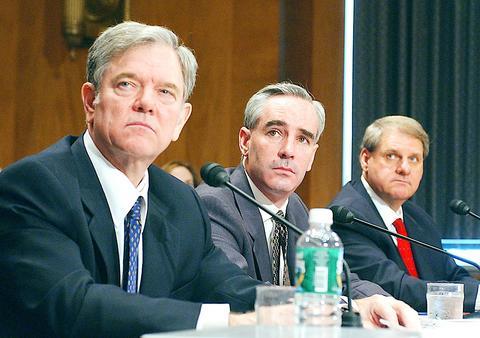A respected US bank discreetly helped former Chilean dictator Augusto Pinochet to hide millions of dollars over an eight-year period, even after he was arrested in London in 1998 and a court froze his assets, a US Senate report said on Thursday.
Executives of the Washington-based Riggs Bank approached Pinochet in Chile in 1994 and invited him to open an account, Senator Carl Levin said as he delivered the conclusions of the document in the Senate Permanent Subcommittee on Investigations.
Levin, calling the 88-year-old Pinochet a "notorious military leader accused of involvement with death squads, corruption, arms sales and drug trafficking," said the former general agreed to open the account.

PHOTO: AP
"The bank opened an account for him personally, helped him establish two offshore shell corporations in the Bahamas called Ashburton and Althorp, and then opened more accounts in the name of those shell corporations both here and in the UK," Levin said.
From 1994 to 2002, Pinochet deposited between US$4 million and US$8 million in his Riggs accounts, the report said.
Pinochet, who ruled Chile with an iron fist from 1973 to 1990, was arrested in London in October 1998 after Spanish judge Baltasar Garzon demanded his extradition in order to try him on charges of human-rights abuses.
He was allowed to return to Chile in 2000 after being released on grounds of failing health.
"In 1998, when Mr. Pinochet was arrested in London on charges of crimes against humanity and a court issued an order seeking to freeze his bank accounts, Riggs quietly helped him move money from London to the United States," Levin said.
In March 1999, while Pinochet was still under arrest, the bank authorized the transfer of US$1.6 million from a London account of Althorp to a new account in the US, despite a court order to freeze the accounts, the report said.
"Needless to say, [the bank] didn't alert law enforcement or the courts to his accounts," Levin said. "We can't allow our financial systems to be misused by corrupt dictators, terrorists or other criminals."
In testimony before the committee, Riggs president Lawrence Hebert said the bank "has not been accused of money laundering" and is "fully and actively cooperating with all law enforcement efforts."
But the Senate subcommittee's chairman, Republican Senator Norm Coleman, lamented the bank's decision to keep Pinochet's accounts secret from regulators.
"For eight years, Riggs officials did not verify the source of his wealth, nor did they disclose the existence of these accounts to the Office of the Comptroller of the Currency," Coleman said.
In Santiago, Chilean President Ricardo Lagos said that if the report were confirmed, an investigation would be appropriate.
"If the result of the US Senate investigation determines that level of accounts, and who the account holder is, some kind of commission probably should be set up to investigate" to determine "the nature of those accounts," Lagos said.

Incumbent Ecuadoran President Daniel Noboa on Sunday claimed a runaway victory in the nation’s presidential election, after voters endorsed the young leader’s “iron fist” approach to rampant cartel violence. With more than 90 percent of the votes counted, the National Election Council said Noboa had an unassailable 12-point lead over his leftist rival Luisa Gonzalez. Official results showed Noboa with 56 percent of the vote, against Gonzalez’s 44 percent — a far bigger winning margin than expected after a virtual tie in the first round. Speaking to jubilant supporters in his hometown of Olon, the 37-year-old president claimed a “historic victory.” “A huge hug

Two Belgian teenagers on Tuesday were charged with wildlife piracy after they were found with thousands of ants packed in test tubes in what Kenyan authorities said was part of a trend in trafficking smaller and lesser-known species. Lornoy David and Seppe Lodewijckx, two 19-year-olds who were arrested on April 5 with 5,000 ants at a guest house, appeared distraught during their appearance before a magistrate in Nairobi and were comforted in the courtroom by relatives. They told the magistrate that they were collecting the ants for fun and did not know that it was illegal. In a separate criminal case, Kenyan Dennis

A judge in Bangladesh issued an arrest warrant for the British member of parliament and former British economic secretary to the treasury Tulip Siddiq, who is a niece of former Bangladeshi prime minister Sheikh Hasina, who was ousted in August last year in a mass uprising that ended her 15-year rule. The Bangladeshi Anti-Corruption Commission has been investigating allegations against Siddiq that she and her family members, including Hasina, illegally received land in a state-owned township project near Dhaka, the capital. Senior Special Judge of Dhaka Metropolitan Zakir Hossain passed the order on Sunday, after considering charges in three separate cases filed

APPORTIONING BLAME: The US president said that there were ‘millions of people dead because of three people’ — Vladimir Putin, Joe Biden and Volodymyr Zelenskiy US President Donald Trump on Monday resumed his attempts to blame Ukrainian President Volodymyr Zelenskiy for Russia’s invasion, falsely accusing him of responsibility for “millions” of deaths. Trump — who had a blazing public row in the Oval Office with Zelenskiy six weeks ago — said the Ukranian shared the blame with Russian President Vladimir Putin, who ordered the February 2022 invasion, and then-US president Joe Biden. Trump told reporters that there were “millions of people dead because of three people.” “Let’s say Putin No. 1, but let’s say Biden, who had no idea what the hell he was doing, No. 2, and